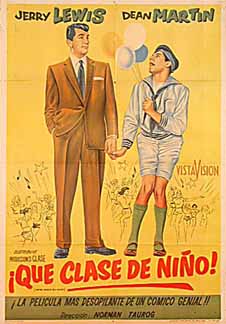
YOU'RE NEVER TOO YOUNG
US, 1955, 102 minutes, Colour.
Dean Martin, Jerry Lewis, Diana Lynn, Nina Foch, Raymond Burr, Veda Ann Borg.
Directed by Norman Taurog.
You’re Never Too Young was one of Martin and Lewis’s successful romantic comedies. It is, however, a reworking of Billy Wilder’s 1942 film The Major and the Minor with Ginger Rogers and Ray Milland. In that film Ginger Rogers masqueraded as a twelve-year-old girl. This time it is Jerry Lewis in the female role but as a twelve-year-old boy.
Living it Up, made at this time, was a remake of Nothing Sacred in which Jerry Lewis then took the role that Carole Lombard played in the original.
The film has the usual ingredients, Dean Martin as the romantic hero, scoring over Jerry Lewis. Jerry Lewis is the likeable (though to many audiences irritating) young man whose dream it is to become a great barber. Diana Lynn, who had appeared with Martin and Lewis in the My Friend Irma films, is the romantic lead.
Norman Taurog had been making films as the silent era and had won an Oscar for his film Skippy. He was to make quite a number of the Martin and Lewis comedies as well as many of the Elvis Presley musicals.
1. The success of this film as a Martin and Lewis comedy? Audience expectations from the comedy of Jerry Lewis, the contribution, especially musical, from Dean Martin? Was this a good example? Its popularity in its time?
2. The contribution of colour, New York settings, the train and the mid west? How valuable were the songs, the music?
3. The film was a re-make of a comedy classic. Jerry Lewis took the Ginger Rogers' role. The implications of this for comedy, the reversal of male-female situations and relationships?
4. How plausible was the plot? Did this matter for this kind of comedy? How much did it depend for its success on its atmosphere of unreality?
5. Audience involvement via the opening, Noonan and his committing the crime, violence? The problem with the jewel? Rob and the presentation of the suave personality from the mid-west? Wilbur and his inefficiency, the comedy turn as barber? the quick involvement for each of them with the
problem of the jewel?
6. The focus on Wilbur and the comedy through his character? Signalling him out as inept, with the routine at the barbers?
7. The success of Jerry Lewis in the character of Wilbur, his strengths and his weaknesses, the emphasis on stupidity? the type of comedy routines in which he was involved? Their character and their success? The importance of his pretending to be a young boy because of the train fare? The humour of getting the ticket, the dilemmas on the train, the meeting with Nancy? The fact that he got in to so many scrapes that he was liked, yet lost the girl? What kind of comedy character does Jerry Lewis portray?
8. The contrast of Bob and Dean Martin's style? His relationship with Wilbur? His love for Nancy? The elements of suspicion and the ways these were illustrated, his work at the school, his relationship with Gretchen and her trying to hold him, his attitude towards the army? the farcical elements in which he was involved and played straight man? His involvement in the dangers and the resolution? How attractive a heroine was Nancy, her presence on the train, her taking Wilbur at his face value, the ambiguity of their relationship from the point of view of the audience, the double romance? Her role in the school and people's suspicions and her vindication of herself? Her brother?
10. The satire on the predatory woman in the character of Gretchen? Her smartness, her bitchiness, her role in the school? Her holding onto Bob? The way that she was out-foiled by Wilbur?
11. The satire on the girls in the school? Their throwing themselves at Wilbur? The satire on teenagers and their romantic loves?
12. How did the film build up to a climax after the events in the school? The atmosphere of the dance and the exposure of Wilbur as the barber, the elaborate water chase? How humorous?
13. The happy ending? Appropriate for this kind of romantic comedy? The irony underlying the comedy in the relationships of children and adults, males and females?